Charles E W Bean, Diaries, AWM38 3DRL 606/247/1 - 1917 - 1933 - Part 20
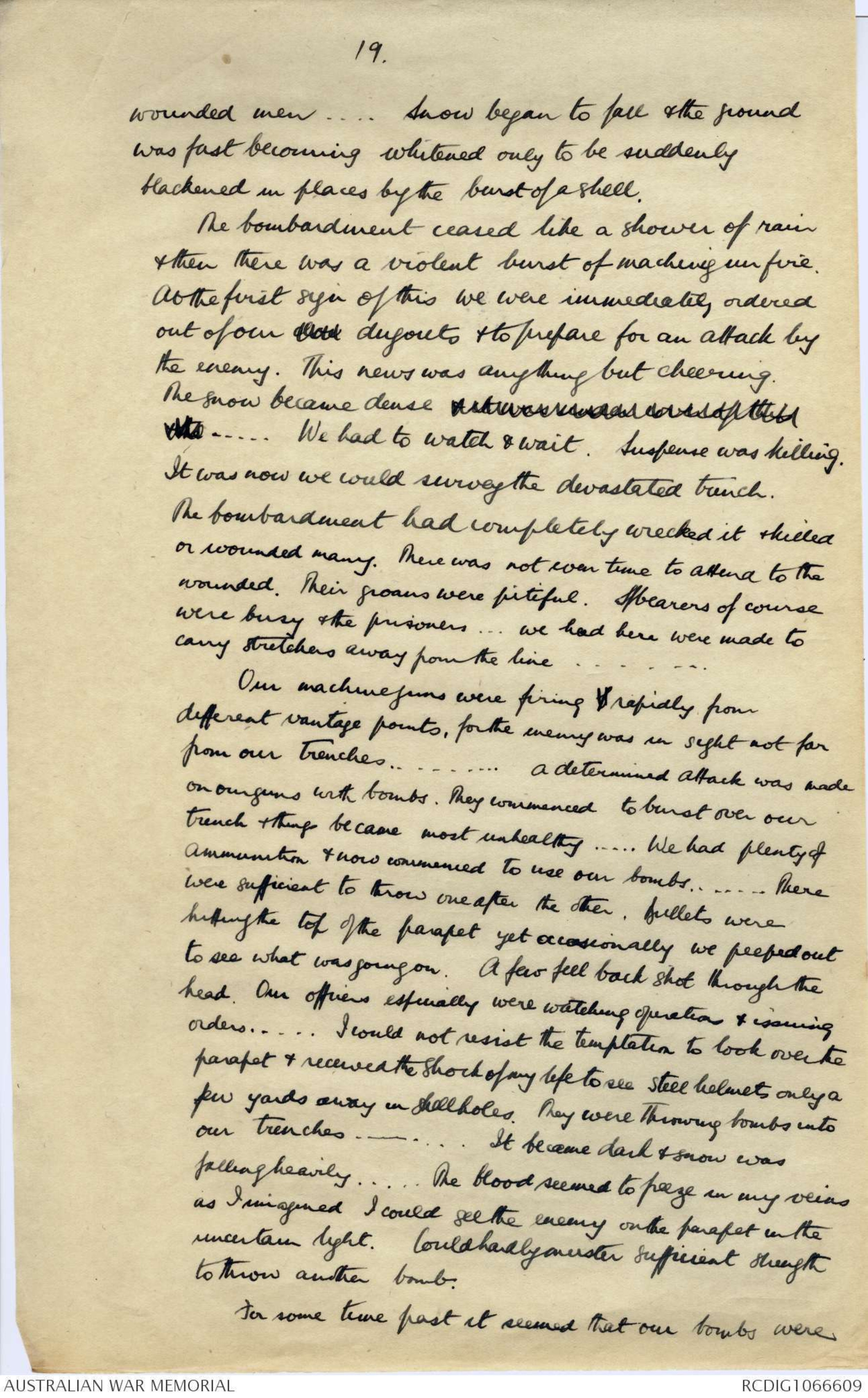
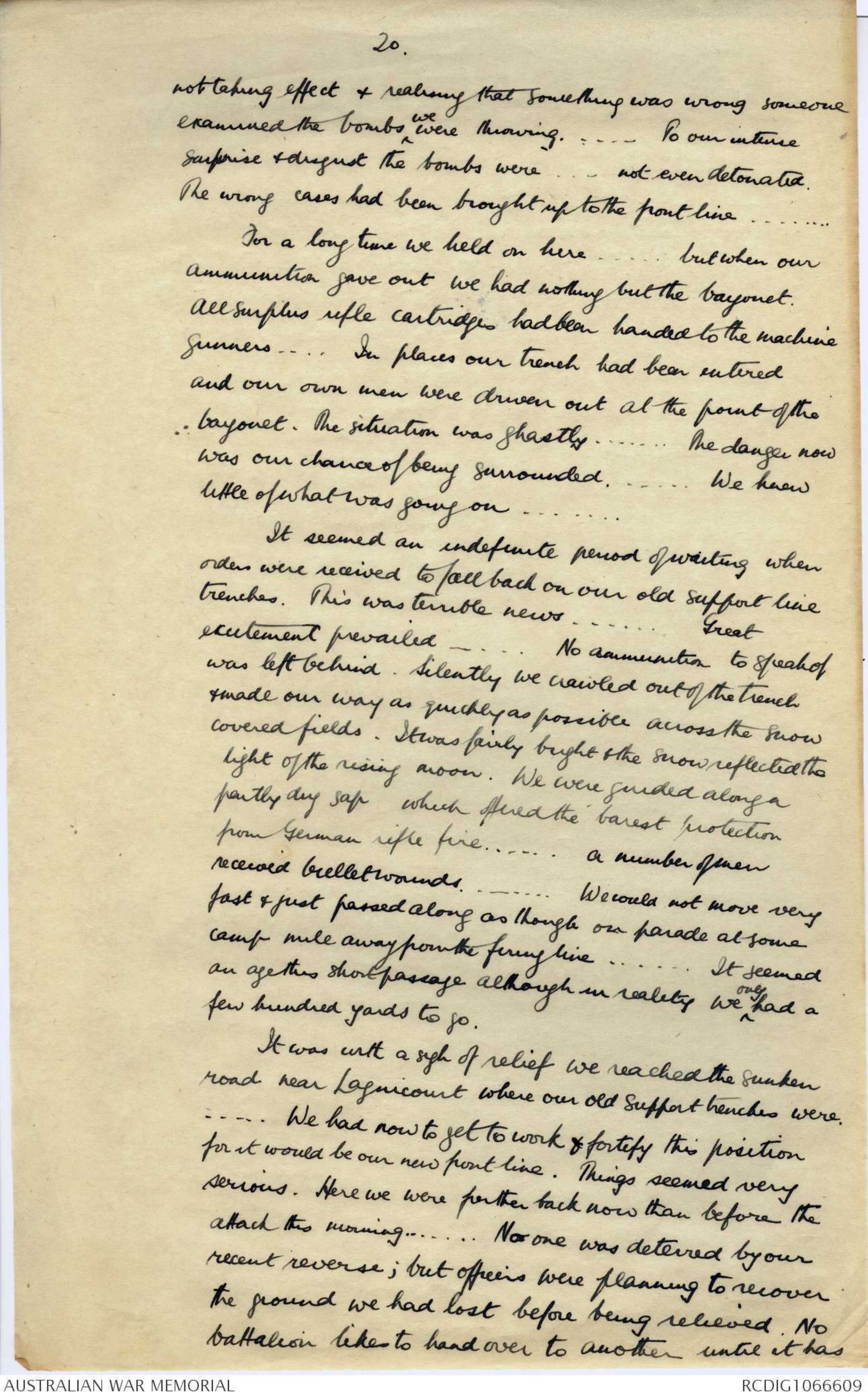
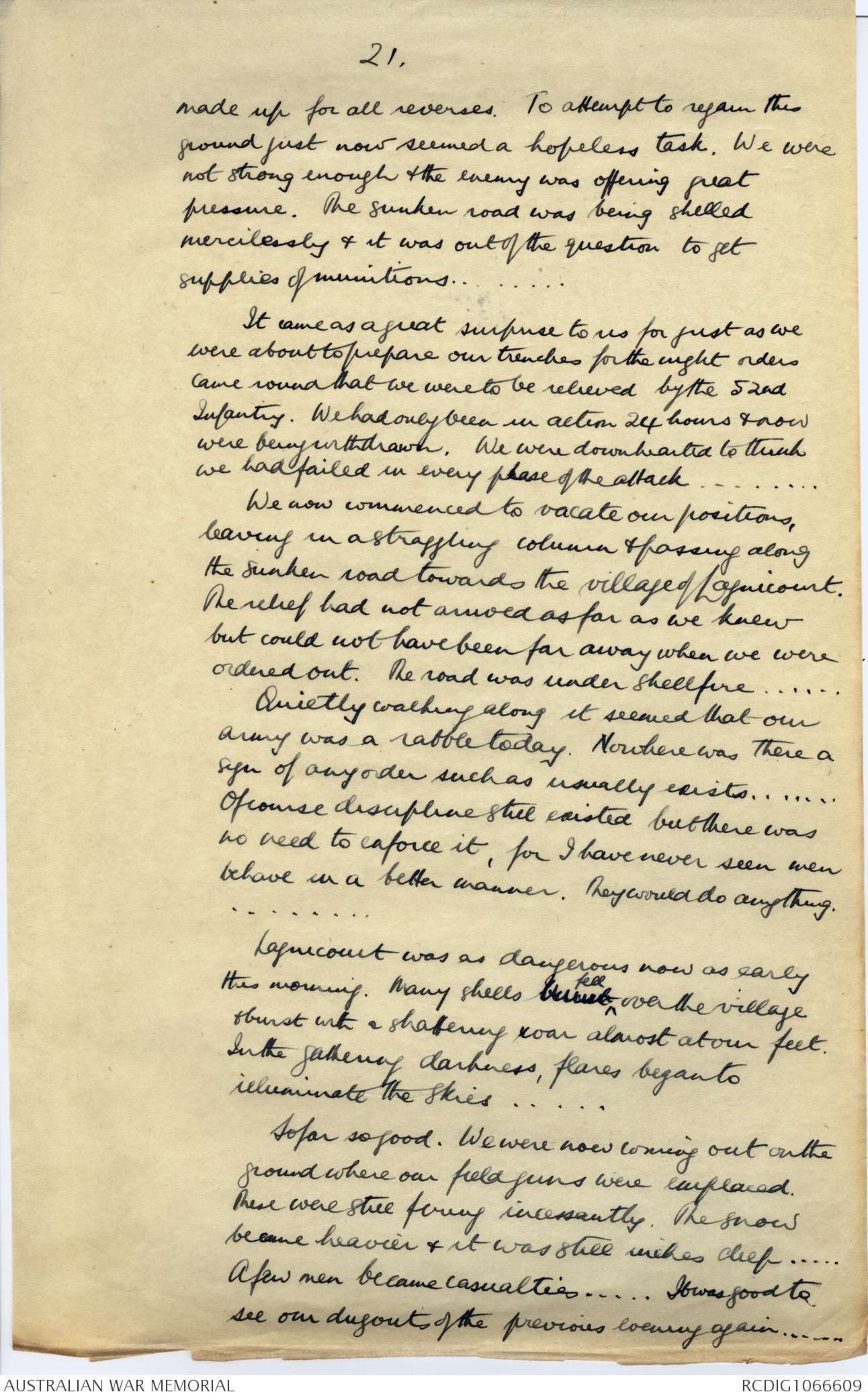
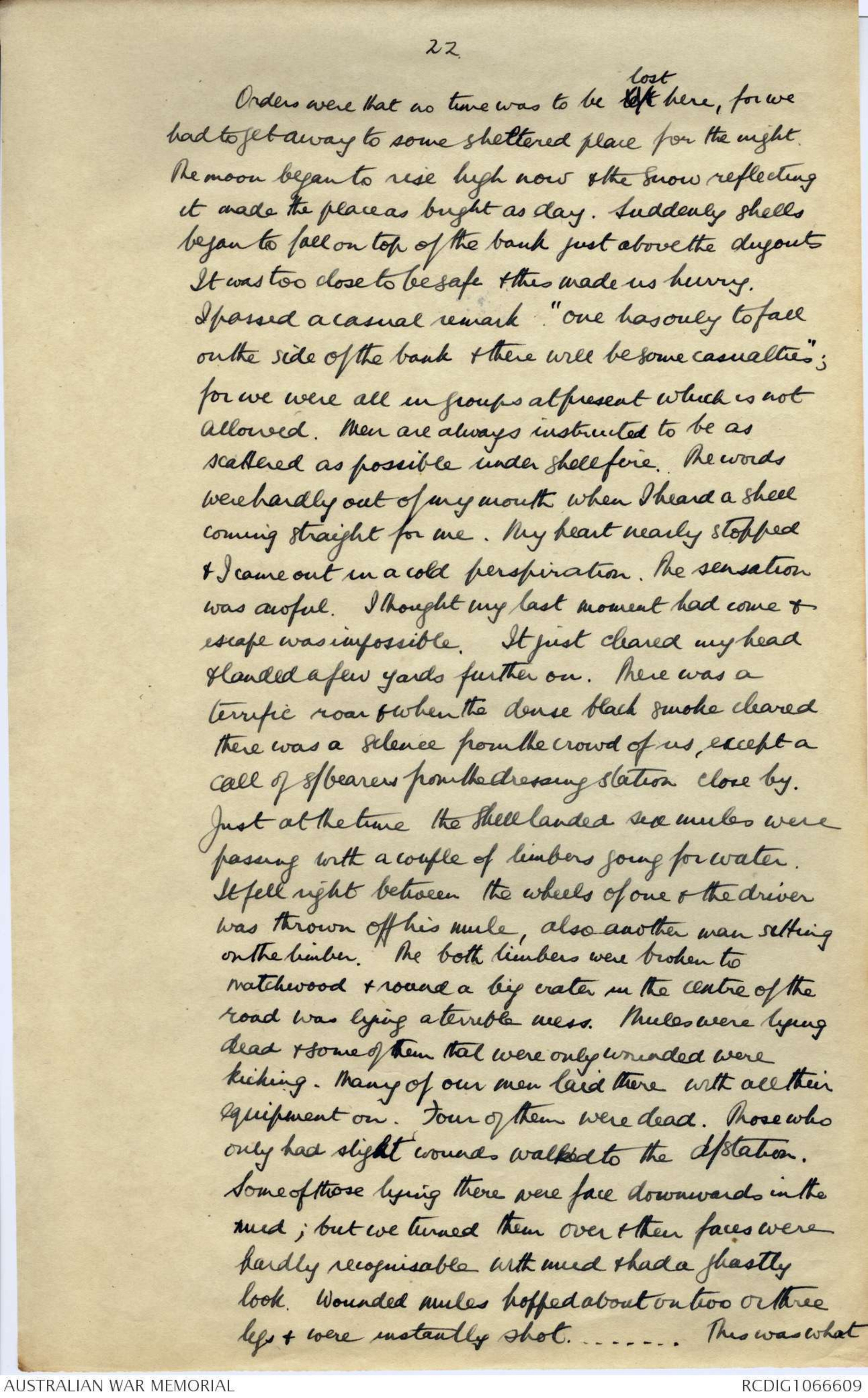
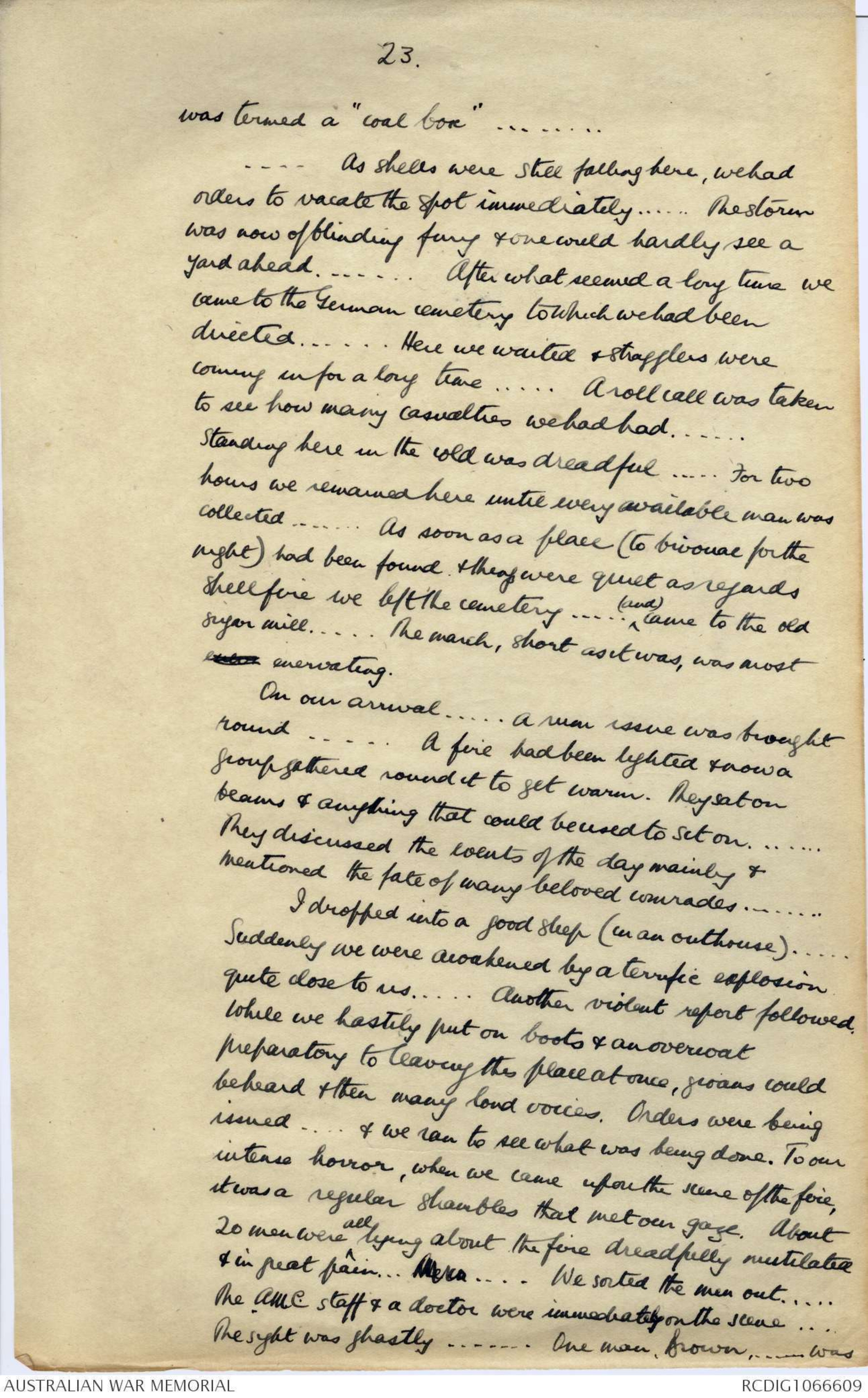
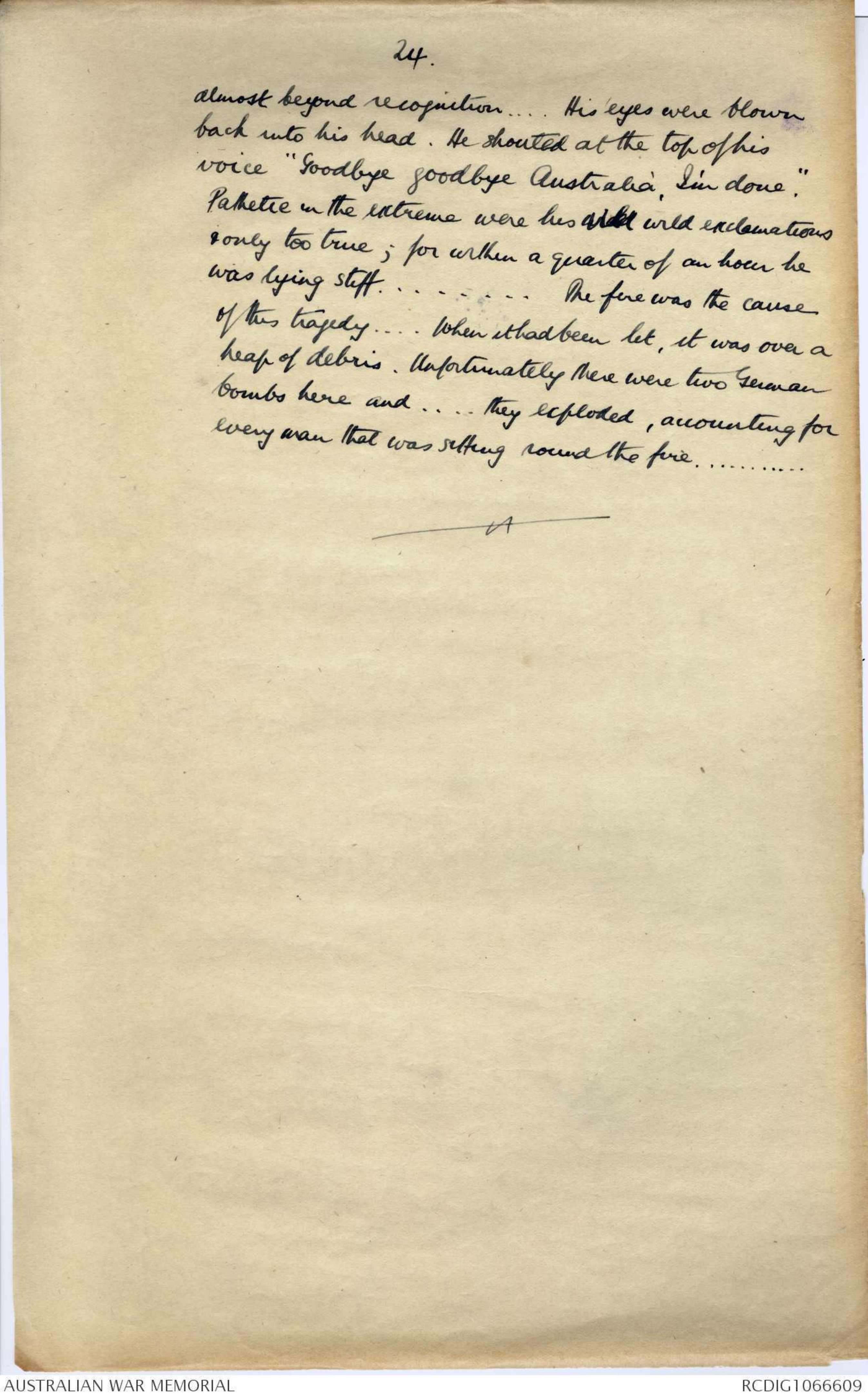
19.
wounded men ....... Snow began to fall & the ground
was fast becoming whitened only to be suddenly
blackened in places by the burst of shell.
The bombardment ceased like a shower of rain
& then there was a violent burst of machinegunfire
At the first sign of this we were immediately ordered
out of our xxx dugouts & to prepare for an attack by
the enemy. This news was anything but cheering.
The snow became dense xxxxxxxxxxxxxxxxxxxxxxxx
xxxx----- We had to watch & wait. Suspense was killing
It was now we could survey the devastated trench.
The bombardment had completely wrecked it & killed
or wounded many. There was not even time to attend to the
wounded. Their groans were pitiful. S/bearers of course
were busy & the prisoners . . . we had here were made to
carry stretchers away from the line. . . . . . .
Our machine guns were firing x rapidly from
different vantage points, for the enemy was in sight not far
from our trenches. . . . . . . . . a determined attack was made
on our guns with bombs. They commenced to burst over our
trench & things became most unhealthy . . . . . We had plenty of
Ammunition & now commenced to use our bombs. . . . . . . . There
were sufficient to throw one after the other, bullets were
hitting the top of the parapet yet occasionally we peeped out
to see what was going on. A few fell back shot through the
head. Our officers especially were watching operations & issuing
orders . . . . . . I could not resist the temptation to look over the
parapet & received the shock of my life to see steel helmets only a
few yards away in shellholes. They were throwing bombs into
our trenches . . . . . It became dark & snow was
falling heavily . . . . . . . The blood seemed to freeze in my veins
as I imagined I could see the enemy on the parapet in the
uncertain light. Could hardly muster sufficient strength
to throw another bomb.
For some time past it seemed that our bombs were
20.
not taking effect & realising that something was wrong someone
examined the bombs ^we were throwing. . . . . . To our intense
surprise & disgust the bombs were . . . not even detonated.
The wrong cases had been brought up to the front line
For a long time we held on here. . . . . .but when our
ammunition gave out we had nothing but the bayonet.
All surplus rifle cartridges had been handed to the machine
gunners. . . . . In places our trench had been entered
and our own men were driven out at the front of the
bayonet. The situation was ghastly. . . . . . .The danger now
was our chance of being surrounded. . . . . . We knew
little of what was going on. . . . .
It seemed an indefinite period of waiting when
orders were received to fall back on our old support line
trenches. This was terrible news. . . . . Great
excitement prevailed . . . . . . . . No ammunition to speak of
was left behind. Silently we crawled out of the trench
& made our way as quickly as possible across the snow
covered fields. It was fairly bright & the snow reflected the
light of the raising moon. We were guided along a
partly dug sap. which offered the barest protection
from German rifle fire . . . . . a number of men
received bullet wounds . . . . . We could not move very
fast & just passed along as though on parade at some
camp mule away from the firing line. . . . . . It seemed
an age this short passage although in reality we ^only had a
few hundred yards to go.
It was with a sigh of relief we reached the sunken
road near Lagnicourt where our old support trenches were
. . . . . We had now to get to work & fortify this position
for it would be our new front line. Things seemed very
serious. Here we were further back now than before the
attack this morning. . . . . No one was deterred by our
recent reverse; but officers were planning to recover
the ground we had lost before being relieved. No
battalion likes to hand over to another until it has
21
made up for all reverses. To attempt to regain this
ground just now seemed a hopeless task. We were
not strong enough & the enemy was offering great
pressure. The sunken road was being shelled
mercilessly & it was out of the question to get
supplies of munitions. . . . . . . . . .
It came as a great surprise to us for just as we
were about to prepare our trenches for the night orders
came round that we were to be relieved by the 52nd
Infantry. We had only been in action 24 hours & now
were being withdrawn. We were down hearted to think
we had failed in every phase of the attack. . . . . . .
We now commenced to vacate our positions,
leaving in a straggling column & passing along
the sunken road towards the village of Lagnicourt.
The relief had not arrived as far as we knew
but could not have been far away when we were
ordered out. The road was under shellfire. . . . . . .
Quietly walking along it seemed that our
army was a rabble today. Nowhere was there a
sign of any order such as usually exists. . . . . . .
Of course discipline still existed but there was
no need to enforce it, for I have never seen men
behave in a better manner. They would do anything
Lagnicourt was as dangerous now as early
this morning. Many shells xxxxx ^fell over the village
& burst with a shattering roar almost at our feet.
In the gathering darkness, flares began to
illuminate the skies........
So far so good. We were now coming out on the
ground where our field guns were emplaced.
These were still firing incessantly. The snow
became heavier & it was still inches deep. . . . ..
A few men became casualties. . . . . . It was good to
see our dugouts of the previous evening again. . . . .
22
Orders were that no time was to be left ^lost here, for we
had to get away to some sheltered place for the night.
The moon began to rise high now & the Snow reflecting
it made the place as bright as day. Suddenly shells
began to fall on top of the bank just above the dugouts
It was too close to be safe & this made us hurry.
I passed casual a remark "one has only to fall
on the side of the bank & there will be some casualties";
for we were all in groups at present which is not
allowed. Men are always instructed to be as
scattered as possible under shell fire. The words
were hardly out of my mouth when I heard a shell
coming straight for me. My heart nearly stopped
& I came out in a cold perspiration. The sensation
was awful. I thought my last moment had come &
escape was impossible. It just cleared my head
& landed a few yards further on. There was a
terrific roar & when the dense black smoke cleared
there was a silence from the crowd of us, except a
call of s/bearers from the dressing station close by.
Just at the time the shell landed six mules were
passing with a couple of limbers going for water.
It fell right between the wheels of one & the driver
was thrown off his mule, also another man sitting
on the limber. The both limbers were broken to
matchwood & round a big crater in the centre of the
road was lying a terrible mess. Mules were lying
dead & some of them that were only wounded were
kicking. Many of our men laid there with all their
equipment on. Four of them were dead. Those who
only had slight wounds walked to the d/station.
Some of those lying there were face downwards in the
mud; but we turned them over & their faces were
hardly recognisable with mud & had a ghastly
look. Wounded mules hopped about on two or three
legs & were instantly shot. . . . . . This was what
23
was termed a "coal box". . . . . . . .
. . . . . as shells were still falling here, we had
orders to vacate the spot immediately. . . . . . The storm
was now of blinding fury & one would hardly see a
yard ahead. . . . . . After what seemed a long time we
came to the German cemetery to which we had been
directed. . . . . Here we waited & stragglers were
coming in for a long time. . . . . A roll call was taken
to see how many casualties we had had. . . . . . .
Standing here in the cold was dreadful .. . . . . For two
hours we remained here until every available man was
collected. . . . . . . As soon as a place (to bivouac for the
night) had been found & things were quiet as regards
shellfire we left the cemetery. . . . . . ^(and) came to the old
sugar mill. . . . . . The march, short as it was, was most
xxxx enervating.
On our arrival. . . . . . . . . a [[?]] issue was brought
round. . . . . . a fire had been lighted & now a
ground gathered round it to get warm. They sat on
beams & anything that could be used to sit on. . . . . .
They discussed the events of the day mainly &
mentioned the fate of many beloved comrades. . . . .
I dropped into a good sleep (in an outhouse). . . . .
Suddenly we were awakened by a terrific explosion
quite close to us. . . . . another violent report followed.
While we hastily put on boots & an overcoat
preparatory to leaving this place at once, groans could
be heard & then many loud voices. Orders were being
issued. . . . & we ran to see what was being done. To our
intense horror, when we came upon the scene of the fire,
it was a regular shambles that met our gaze. About
20 men were ^all lying about the fire dreadfully mutilated
& in great pain. . . xxxxx. . . . We sorted the men out. . . . .
The A.M.C. staff & a doctor were immediately on the scene. . .
The sight was ghastly. . . . . . . One man, Brown. . . . . was
24
almost beyond recognition. . . . His eyes were blown
back into his head. He shouted at the top of his
voice "Goodbye goodbye Australia", I'm done"
Pathetic in the extreme were his xxx wild exclamations
& only too true; for within a quarter of an hour he
was lying stiff. . . . . . . . The fire was the cause
of this tragedy. . . . . When it had been lit, it was over a
heap of debris. Unfortunately there were two German
bombs here and . . . . they explode, accounting for
every man that was sitting around the fire. . . . . . . . . .
 Loretta Corbett
Loretta CorbettThis transcription item is now locked to you for editing. To release the lock either Save your changes or Cancel.
This lock will be automatically released after 60 minutes of inactivity.